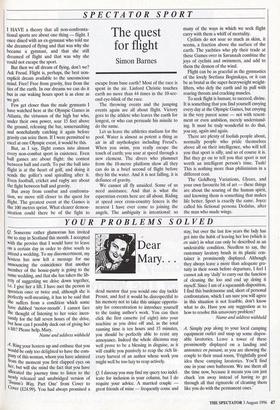SPECTATOR SPORT
The quest for flight
Simon Barnes
I HAVE a theory that all non-confronta- tional sports are about one thing — flight. I once dined with an ex-gymnast who told me she dreamed of flying and that was why she became a gymnast, and that she still dreamed of flight and that was why she could not escape the sport.
But then we all dream of flying, don't we? Ask Freud. Flight is, perhaps, the best non explicit dream available to the unconscious mind. Free! Free from gravity, free from the ties of the earth. In our dreams we can do it but in our waking hours sport is as close as we get.
Few get closer than the male gymnasts I have watched here at the Olympic Games in Atlanta, the virtuosos of the high bar who, under their own power, soar 15 feet above the ground, releasing the bar, somersaulting and nonchalantly catching it again before gravity can seize them. If I were permitted to excel at one Olympic event, it would be this. But, as I say, flight comes into almost every non-combat sport in existence. Even ball games are about flight: the contest between ball and earth. To put the ball into flight is at the heart of golf, and doing it sends the golfer's soul spiralling after it. Even football, cricket and rugby are about the fight between ball and gravity.
But away from combat and confronta- tion, we move still closer to the quest for flight. The greatest event at the Games is the 100 metres sprint. What clearer demon- stration could there be of the fight to escape from base earth? Most of the race is spent in the air. Linford Christie touches earth no more than 44 times in the 10-sec- ond eye-blink of the race.
The throwing events and the jumping events again are all about flight. Victory goes to the athlete who leaves the earth for longest, or who can persuade his missile to do the same.
Let us leave the athletics stadium for the pool. Water is almost as potent a thing as air in all mythologies including Freud's. When you swim, you really escape the touch of earth; you soar at speed through a new element. The divers who plummet from the 10-metre platform show all they can do in a brief second of flight before they hit the water. And it is not falling, it is defiance of gravity.
We cannot all fly unaided. Some of us need assistance. And that is what the equestrian events here are all about. Riding at speed over cross-country fences is the nearest I, have ever come to joining the angels. The ambiguity is intentional: so
many of the ways in which we seek flight carry with them a whiff of mortality.
Cyclists do not soar so much as skim, it seems, a fraction above the surface of the earth. The yachties who ply their trade at these Games over in Savannah combine the joys of cyclists and swimmers, and add to them the demon of the wind.
Flight can be as graceful as the gymnastics of the lovely Svetlana Boginskaya, or it can be as brutal as the super-heavyweight weight- lifters, who defy the earth and its pull with roaring throats and cracking muscles.
To seek flight is human; to succeed, divine. It is something that you fmd yourself envying every day at the Olympic Games, but envying in the very purest sense — not with resent- ment or even ambition, merely understand- ing. It must be truly wonderful to do that, you say, again and again.
There are plenty of foolish people about, normally people who pride themselves above all on their intelligence, who will tell you that sport is silly, and so of course it is. But they go on to tell you that sport is not worth an intelligent person's time. Tush! This is nothing more than philistinism in a different coat.
The Goldberg Variations, Ulysses, and your own favourite bit of art — these things are about the soaring of the human spirit, and knowing them is something that makes life better. Sport is exactly the same. Joyce called his fictional persona Dedalus, after the man who made wings.


















































 Previous page
Previous page